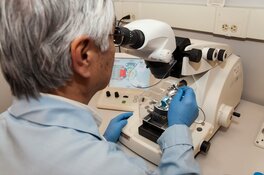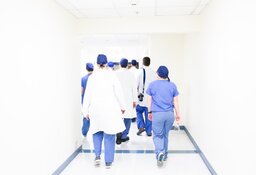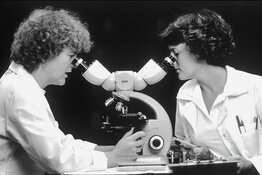For more than 40 years, American television every Labor Day was dominated by comedian Jerry Lewis and his Muscular Dystrophy Association all-day telethon, which raised US$2.45 billion for research into the disease through 2009. Sernova Corp. (SVA:TSX.V; SEOVF:OTCMKTS; XETRA:PSH)
The telethon officially went off the air in 2015, but the attention brought to the disease paid off when a new drug from Sarepta Therapeutics Inc. showed positive clinical data for the treatment of certain rare types of the disease. Its stock nearly tripled in value at the time in 2012 and is still worth nearly 400% of its value before that first announcement.
New discoveries are being made all of the time, but Chris Temple, author of The National Investor newsletter, believes another company may be on the cusp of delivering a similar windfall because of what he said is the quality of its technology and its extremely undervalued share price.
Clinical-stage biotechnology company Sernova Corp. (SVA:TSX.V; SEOVF:OTCMKTS; XETRA:PSH) is developing therapeutic cell technologies for chronic diseases, including insulin-dependent diabetes (Type 1), thyroid disease, and hemophilia A. Its Cell Pouch™ system is a new implantable medical device that can act as a "pseudo-organ" and deliver therapeutic cells to the body.
In ongoing trials of the technology, a total of seven patients have achieved insulin independence for its use with diabetes, including one for more than four years. New data is expected to be presented at a conference in Madrid on September 9-13 by study leader Dr. Piotr Witkowski.
The company also noted it would be participating in the H.C. Wainwright 26th Annual Global Investment Conference September 9-11 in New York, with one-on-one meetings and a webcast of its presentation.
"Sernova, like a lot of biotech companies, is certainly not without risk," Temple told Streetwise Reports. "But when you look at the advancements they've already made, specifically with their patients and trials, a lot of de-risking has already been done."
He also stressed the upside possible if the Sarepta example is any indication. Sernova's stock, once as high as CA$2 per share in 2022, is now just US$0.33 but has been rising steadily since it recently announced its new chief executive officer, Jonathan Rigby.
According to a report on Dow Jones Newswires by Robb M. Stewart, Rigby has experience raising capital for biotech companies and has led multiple companies through listings onto Nasdaq. Rigby is Type 1 diabetic himself.
"Here's a guy who has got some skin in the game, more than the average person knows, and it goes beyond money," Temple said. "It's his own life now, and it's his own lifestyle."
Temple also has personal experience at play in supporting the company, which he has recommended for five years. His son died five years ago of the disease, and two adult children suffer from it.
"It's a constant grind; it never goes away," he said.
Technology Not Just for Diabetes
On its website, Sernova said it is developing a "functional cure" for Type 1 diabetes with the Cell Pouch™ system, which forms a natural, vascularized tissue environment in the body, allowing for the long-term release of therapeutic cells absent or deficient in certain chronic diseases.
It's not just insulin and diabetes; they are also researching its use to deliver thyroid hormones and treatments for hemophilia A. However, Temple stressed that technology could be used to deliver almost any cells or proteins to the body.
"There are any number of indications that are going to require these next generations of gene therapy, stem cells, IPSC cells, or whatever the case may be, for a whole host of indications that need a home in the body that is workable for those cells," he noted.
Sernova's said therapeutic cells are transplanted into the organ-like vascularized implantable device, the Cell Pouch™, which "generates proteins, hormones or factors released into the bloodstream for treatment of diseases requiring replacement of these molecules in the body and for which patients must take injections on a regular basis."
Analyst: Co. Stands Alone in Sector
The company "continues to stand alone" in the sector, and analysts at H.C. Wainwright & Co. continue to be encouraged by the trials.
"We believe the impressive response rates and observed durability support Sernova's strategy and justify further investigation while positioning the technology for potential commercial success," analyst Joseph Pantginis wrote in a June 25 research note, giving the stock a Buy rating with CA$6 per share target, a more than 1,700% gain from its price on September 6.
"We are encouraged by the trial's progress and look forward to data and updates in the near future that we believe should provide welcome guidance related to the design, initiation, and timeline of a possible Phase 3 pivotal study," analyst Joseph Pantginis wrote.
"We are encouraged by the trial's progress and look forward to data and updates in the near future that we believe should provide welcome guidance related to the design, initiation, and timeline of a possible Phase 3 pivotal study," the analyst wrote.
So far, the technology uses donor islet cells from cadavers for insertion in the pouch, but it has partnered with Evotec to manufacture and supply induced pluripotent stem cell-derived islet cell clusters (iPSC-ILCs) that would fool immune systems.
"Preclinical evaluation of EVO’s off-the-shelf iPSC-ILCs incorporated in SVA’s cell pouch demonstrated equivalent or superior capacity to drive durable insulin independence vs. those implanted with human donor cells; IND-enabling studies will proceed through 2024," Analyst Rahul Sarugaser of Raymond James wrote in a June 25 company brief. "SVA (with potential financial participation from EVO) intends to file its IND and initiate a Phase 1/2 clinical trial evaluating its iPSC-embedded Cell Pouch System in late 2025, with a finalized manufacturing process in place during 2024."
The Catalyst: Number of Patients Growing
According to the International Diabetes Foundation, diabetes affects 537 million globally and is expected to affect 643 million people by 2030. Nations spend as much as 9% of their health budget on the disease, and about 10% of diabetes patients are insulin-dependent.
"The standard of care for patients with reduced or missing critical hormones or proteins, such as insulin, is monitoring and trying to maintain appropriate levels through frequent injections. Chronic irregular swings in levels of these can result in serious acute and chronic side effects," Sernova noted on its website.
Grand View Research reported that the global market size for diabetes devices was estimated at about US$30.31 billion in 2023 and is projected to grow at a CAGR of 7.45% from 2024 to 2030.
"The market is primarily driven by growing prevalence of diabetes, advanced technology, the growing usage of insulin delivery devices, and the rise in obesity rates," the report said. "Major manufacturers are concentrating on technological innovation and the creation of advanced products to secure a significant portion of the market."
In a separate report, Grand View Research noted that the treatment market size for thyroid gland disorder was US$2.22 billion in 2023 and is expected to grow at a CAGR of 3.6% from 2024 to 2030.
"The aging population, autoimmune diseases, and iodine deficiency play a significant role in boosting market growth," the company said.
 Streetwise Ownership Overview*
Streetwise Ownership Overview*
Sernova Corp. (SVA:TSX.V;SEOVF:OTCMKTS;XETRA:PSH)
"In addition, the growing awareness programs and advancements in treatment options, including precision medicine and targeted drug development, are anticipated to fuel the thyroid gland disorder treatment market in the forecast period."
The market for treating hemophilia is also expected to rise globally, the research firm said in another report. It was estimated at US$12.6 billion in 2022 and is expected to grow at a CAGR of 6.6% from 2023 to 2030.
Ownership and Share Structure
According to Refinitiv, about 12.96% of the company is held by insiders and management, and 0.05% by institutions. The rest is retail.
Top shareholders include Tomas Angel with 4.91%, Director Steven Sangha with 4.27%, Betty Anne Millar with 1.32%, Brett Alexander Whalen with 0.87%, and Garry Deol with 0.77%.
The company has 303.61 million shares outstanding a CA$100.19 million market cap. It trades in a 52-week range of CA$0.20 and CA$0.91.
| Want to be the first to know about interesting Biotechnology / Pharmaceuticals investment ideas? Sign up to receive the FREE Streetwise Reports' newsletter. | Subscribe |
Important Disclosures:
- Sernova Corp. has a consulting relationship with Street Smart an affiliate of Streetwise Reports. Street Smart Clients pay a monthly consulting fee between US$8,000 and US$20,000.
- As of the date of this article, officers and/or employees of Streetwise Reports LLC (including members of their household) own securities of Sernova Corp.
- Steve Sobek wrote this article for Streetwise Reports LLC and provides services to Streetwise Reports as an employee.
- This article does not constitute investment advice and is not a solicitation for any investment. Streetwise Reports does not render general or specific investment advice and the information on Streetwise Reports should not be considered a recommendation to buy or sell any security. Each reader is encouraged to consult with his or her personal financial adviser and perform their own comprehensive investment research. By opening this page, each reader accepts and agrees to Streetwise Reports' terms of use and full legal disclaimer. Streetwise Reports does not endorse or recommend the business, products, services or securities of any company.
- This article does not constitute medical advice. Officers, employees and contributors to Streetwise Reports are not licensed medical professionals. Readers should always contact their healthcare professionals for medical advice.
For additional disclosures, please click here.








































